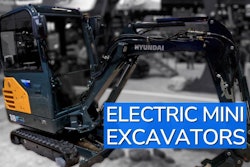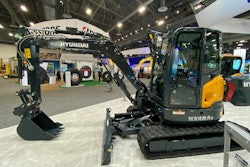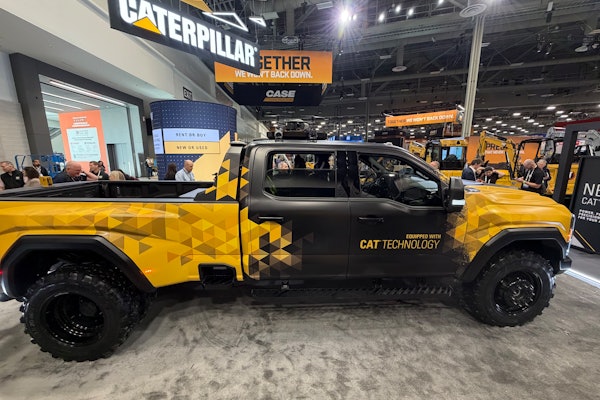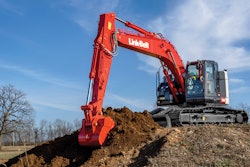As far as the future of the construction industry, and the future of sustainability, Hyundai Construction Equipment sees hydrogen as the pathway forward.
The company made the North American debut of its second-generation hydrogen fuel cell-powered excavator at ConExpo-Con/Agg 2023.
To see more of what OEMs unveiled at ConExpo 2023 on our show page click here.
“You can think of this almost like an electric excavator, but instead of having a battery pack onboard, the fuel cell is the source of the electricity,” said Chris Davies of Hyundai Construction Equipment.
Development of the excavator is the result of an agreement signed in 2020 between Hyundai Construction Equipment, Hyundai Motors, and Hyundai Mobis, at its Mabuk Research Centre in Yongin-si, Gyeonggi-do, South Korea.
The three companies have been working in concert to develop hydrogen fuel cells to power forklifts and medium to large excavators. Currently, Hyundai is focused on the wheeled excavator platform.
"When the system is fully developed and production ready, it can theoretically be scaled and implemented for use in almost any existing platform that currently uses an internal combustion engines," Davies said, with Hyundai previously citing 2023 as a mass production and distribution target deadline.
Like battery-powered equipment, hydrogen-power-based equipment has no emissions. Electricity is generated through the chemical reaction between hydrogen and oxygen, which leaves a byproduct that covers more than 75% of the planet: water.
Davies said the HW155H is proof of the general concept.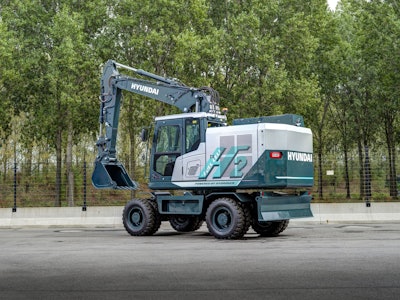 Using technology from its sister companies under the Hyundai umbrella, the HW155H is a 14-ton second-generation hydrogen prototype machine developed by Hyundai Construction Equipment.Hyundai Construction Equipment
Using technology from its sister companies under the Hyundai umbrella, the HW155H is a 14-ton second-generation hydrogen prototype machine developed by Hyundai Construction Equipment.Hyundai Construction Equipment
“This machine has hydrogen stored on board, which then mixes with oxygen in the air to create a chemical reaction in the fuel cell that generates electricity,” he said, noting that the electricity is fed to an electric motor, which drives the hydraulic pump to power the machine like any other.
The hydrogen is stored on the right-hand side of the machine, opposite the operator’s cab, in high-pressure tanks.
“It's a really exciting technology,” Davies said. “Taking the hydrogen on onboard and the oxygen, once that process is finished, there are a couple of pipes at the back of the machine or exhaust.”
He said when the excavator is done running, it evacuates water, and the water won't damage areas of a jobsite where the machine is being operated. During operation, water evacuation is continuous but intermittent.
“It is not going to just dump it all at once at the end of the day and leave a big puddle,” Davies said.
 Once the chemical reaction between the hydrogen and oxygen is completed, generating the electricity to drive the machine, the byproduct or "exhaust" is water.Equipment World
Once the chemical reaction between the hydrogen and oxygen is completed, generating the electricity to drive the machine, the byproduct or "exhaust" is water.Equipment World
The onboard tanks hold enough hydrogen to generate electricity for eight hours continuously, he said.
“That’s eight hours of runtime per fill. And better yet, when it is empty, filling times, depending on the filling station is going to be about 10 to 20 minutes, comparable to a diesel machine of the same platform.”
He acknowledges that Hyundai is a few steps ahead of the hydrogen fueling infrastructure with machines like the HW155H. Now, the best place to get hydrogen is along the western seaboard.
"Whether it's Vancouver or down to San Diego," Davies said. "As far as the infrastructure and networks and ways to deliver hydrogen to the site, those are still a work in progress. There's a lot of investment being done to improve that infrastructure.”
Real-world application testing of the third-generation prototype wheeled excavator with hydrogen fuel cell system is expected to begin soon. The hope is a production-ready model could be available in five years or less. Either way, Davies said, Hyundai Construction Equipment is committed to the technology as being part of the future, and it is a high priority.
“It's a way for us to show the industry and the world that we're really focused on sustainability and a great cleaner and greener future," Davies said.
Prior to the excavator, the technology was already in use in Hyundai’s Nexo fuel cell passenger car. Hyundai’s projections suggest that fuel cell-powered vehicles will be more cost-effective than battery-electric or diesel-powered vehicles in the future.
"We believe hydrogen is the way forward,” Davies said.
For more on alternative fuel options in the construction industry, check out this 8-part series on the evolution of construction equipment and the diesel fuel alternatives.



